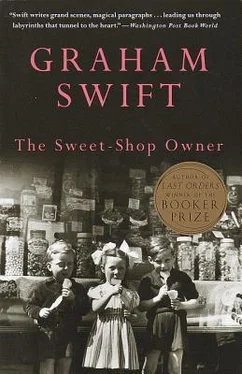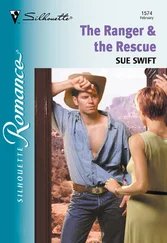Graham Swift - The Sweet-Shop Owner
Здесь есть возможность читать онлайн «Graham Swift - The Sweet-Shop Owner» весь текст электронной книги совершенно бесплатно (целиком полную версию без сокращений). В некоторых случаях можно слушать аудио, скачать через торрент в формате fb2 и присутствует краткое содержание. Год выпуска: 2012, Издательство: Vintage Books USA, Жанр: Современная проза, на английском языке. Описание произведения, (предисловие) а так же отзывы посетителей доступны на портале библиотеки ЛибКат.
- Название:The Sweet-Shop Owner
- Автор:
- Издательство:Vintage Books USA
- Жанр:
- Год:2012
- ISBN:нет данных
- Рейтинг книги:4 / 5. Голосов: 1
-
Избранное:Добавить в избранное
- Отзывы:
-
Ваша оценка:
- 80
- 1
- 2
- 3
- 4
- 5
The Sweet-Shop Owner: краткое содержание, описание и аннотация
Предлагаем к чтению аннотацию, описание, краткое содержание или предисловие (зависит от того, что написал сам автор книги «The Sweet-Shop Owner»). Если вы не нашли необходимую информацию о книге — напишите в комментариях, мы постараемся отыскать её.
The Sweet-Shop Owner — читать онлайн бесплатно полную книгу (весь текст) целиком
Ниже представлен текст книги, разбитый по страницам. Система сохранения места последней прочитанной страницы, позволяет с удобством читать онлайн бесплатно книгу «The Sweet-Shop Owner», без необходимости каждый раз заново искать на чём Вы остановились. Поставьте закладку, и сможете в любой момент перейти на страницу, на которой закончили чтение.
Интервал:
Закладка:
Graham Swift
The Sweet-Shop Owner
For Candice
I
1
‘In the end.’ ‘In the end’? What did she mean — in the end he would see?
Dear Father ,
I have the £15,000. The bank notified me last week. Thank you for sending it at last. I’m sure this is for the best and how Mother would have wanted it. You will see in the end.
I think we can call everything settled now. Don’t bother about the rest of my things. You said I should come — do you really think that’s a good idea? After all that you say I’ve put you through, I should have thought you’d be glad to be finished with me at last.
Dorothy
He sat up, in the double bed, holding the letter before him, looking at it fixedly as if it were really a code in need of breaking. It had come four days ago. He’d read it perhaps fifty times, so that he could remember the words without needing to see them.
‘— finished with me at last.’
So he had seen her perhaps for the last time. And there was not even, before that final signature, a farewell, a ‘take care’, a ‘with love, your daughter’.
He looked at his wrist-watch on the bedside table. Four-thirty. Light spread behind the pale green curtains.
But she would come, surely. Now she had the money. She would come — she hadn’t said she wouldn’t — through the hallway (she still had her key to the front door), past the mirror, the barometer clock, the photographs of Irene and herself on the wall. Her eyes would be moist. She would find him in the armchair in the living-room, by the french windows where he always sat — where Irene had sat with her medicine — still, silent, his hands gripping the arm-rests. She would go down, weep, clasp his knees, as though she were clasping the limbs of a cold, stone statue that stares out and beyond, without seeing.
He would be history.
He folded the letter, smoothed it and switched off the bedside lamp. There was the usual pain in his chest. In the half-light everything stood as if fixed in position for ever. The dressing-table with its angled mirrors; the walnut wardrobe; the two green and white regency-striped chairs; her silver-backed hand-mirror; the china figurines, a shepherd and a shepherdess in eighteenth-century costume for ever on the point of flying into each other’s arms. Nothing had changed (you took nothing that showed, did you Dorry?). Nothing would change.
He drew back the sheets. His belly pressed clammily against his pyjama cord. You could feel already the beginnings of a hot June day.
There was always the sunshine. It had shone then — June, 1949 — through the windows of the nursing home. Trees brushed outside and bees had buzzed in and out of the open windows. Should they have allowed that, with all those babies? He had come, ushered by the nurse, laden with flowers. This might change everything. There was a little thing, wrapped like a gift in a shawl beside her. He had approached the bed with outstretched arms. But she had looked up, immovable, chestnut hair stuck to her forehead, and her eyes had said: There, I have done it, paid you: that is my side of the bargain.
‘The flowers, Willy. Give the flowers to the nurse.’
Light seeped through the folds of the eau-de-nil curtains, turning the room into a dappled pool. She had always slept nearest the window. She could never get enough air.
And would you be glad to know, child — would you understand — that you were just one side of the bargain?
No matter. You’ve got the money now. You’re paid.
And today, Dorry, is your birthday.
He could almost smile at the neatness of it.
He sat up, puffing. In the mirror he could see the reflection of his flushed face, the arc of stubble, the bluish lips, the slightly goggling eyes. Someone mimicking himself. He did not sleep. He was used to early rising. Besides, he would pass long stretches of the night awake, his body sprawled, wooden, like a toy in its box, his mind adrift in the dark. Even before, when she’d breathed laboriously beside him — her face in sleep as it was in waking, solemn, long-suffering — he’d lain like that, like a puppet. And only she had known how to make his little wired joints move, to make his body shift and jerk into action.
Do you know where that money really came from?
The dawn was gathering. Outside he could hear it: the rustle of the breeze in the lilac; the chatter of sparrows. He levered himself slowly to get out of bed. First the good leg then the bad. No exertion, no excitement. Doctor Field had said. And don’t carry on working seven days a week at that shop; take a holiday. It’ll kill you. (Doctor Field — Save my wife.) But there came a time when precautions were irrelevant.
He looked at his watch. Nearly five. No need of alarms. That system hadn’t changed. Getting up, getting ready, going off, seven days a week. And when he’d resisted, shirked, kicked against it (but that had seldom happened), she had been there with her command, to prompt and reprove, to goad him into life like a malingering schoolboy. Do it: play your part. Up at five-fifteen. Wash, shave in the rose-pink bathroom — when he didn’t get a shave at Smithy’s. Breakfast: two eggs, soft-boiled (then Field had said, cut out eggs and butter), tea and toast, at five-thirty. Time enough not to hurry, to dress neatly, to gather his briefcase — the leather had become soft and creased as a glove — to kiss her — her cheek was there to be kissed — to drive to Briar Street in time to collect and mark up the papers, to arrange the shelves, to open at seven-thirty. And Sundays the same, only an hour later.
No, it hadn’t changed. But, sooner or later, you do something for the last time. And then it becomes, perhaps, a kind of victory.
He put on his dressing-gown. No longer in her watchful presence. Spread the blue-bordered table cloth, laid the table, placed the blue and pink patterned china — they never ate hurried, makeshift meals (‘Let’s do it properly’) — as if she were looking still and approving (not a piece of that china had ever been broken), and as if, today of all days, there had spread over her face one of those rare, knowing smiles.
‘That’s right, Willy.’
He took from the wardrobe the dark blue suit, with the maroon braces and the maroon tie and the pale blue shirt with just the thinnest dark stripe. Today of all days he must dress the part. There, on their hangers, were the other suits. The charcoal for formality, the pale grey for sociability, the dark grey for work, the two tweeds, brown and light green, for Saturdays and Sundays.
He straightened his tie. She had chosen all his clothes. Not as gifts, not as little flatteries. She’d seldom given him things in that way. A gold tie-pin once (which she’d advised him to keep at home in a drawer); a silk Paisley scarf. And never, even years ago, had she watched him try on a new jacket before the mirror, button a new waistcoat — tilted her head, put a finger to her cheek, the way women do. She wasn’t like that. But she’d seen that what he got was proper. And always the best and most lasting materials and, always, value for money. Her judgement was firm.
‘That child. She will do something stupid one day.’
There He was ready. The last time. Jacket brushed, shoes polished, hair combed. And if she’d been standing there, in the kitchen doorway, or had settled by then (for she couldn’t stand for long) with the blanket by the french window, she would have given him that little nod, that flicker of the eyelids, as if she’d pressed a switch inside him: ‘Go on now.’ And Dorry would be upstairs still, in her cotton nightdress, asleep. He would look in to see her, as he always did. As if she might have fled already. Hair tumbled, one arm raised on the pillow, as though to touch someone.
Читать дальшеИнтервал:
Закладка:
Похожие книги на «The Sweet-Shop Owner»
Представляем Вашему вниманию похожие книги на «The Sweet-Shop Owner» списком для выбора. Мы отобрали схожую по названию и смыслу литературу в надежде предоставить читателям больше вариантов отыскать новые, интересные, ещё непрочитанные произведения.
Обсуждение, отзывы о книге «The Sweet-Shop Owner» и просто собственные мнения читателей. Оставьте ваши комментарии, напишите, что Вы думаете о произведении, его смысле или главных героях. Укажите что конкретно понравилось, а что нет, и почему Вы так считаете.












